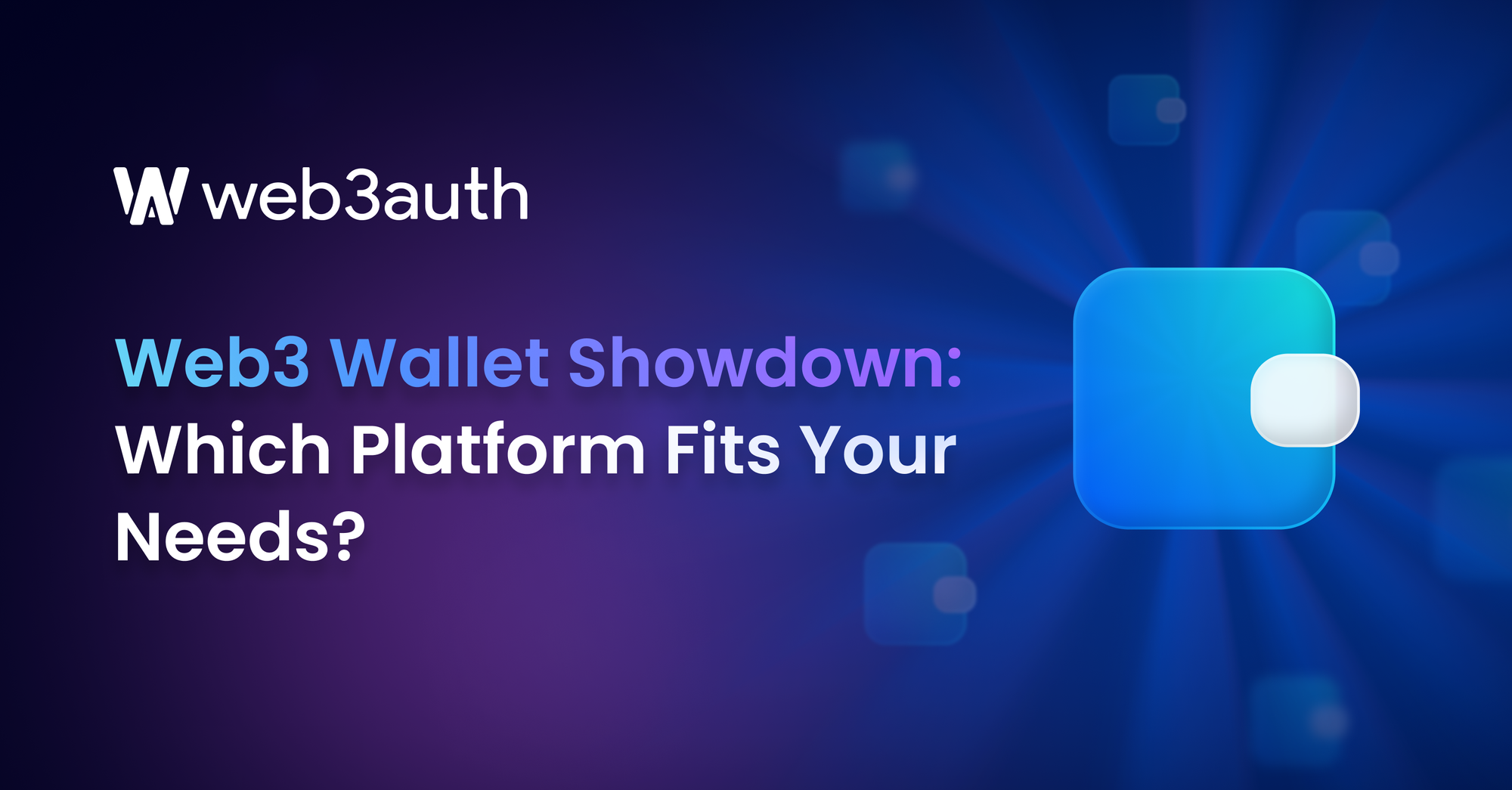On this page
Navigating the landscape of wallet-as-a-service (WaaS) solutions can be daunting, especially for those new to in-dApp Web3 wallets. With so many options available, it’s easy to feel overwhelmed when trying to choose the right one. To simplify the decision-making process, we’ve compiled everything you need to know in this post, helping you find the best solution for your needs.
The surge in new wallet providers highlights the growing demand for more accessible crypto onboarding. Each product offers unique strengths tailored to specific requirements, making it challenging to comprehensively research, analyze, and compare them all. Fortunately, we’ve done the work for you, distilling the key features and differences in this article to help you make an informed choice.
What Features Are You Looking For?
We’ve compared key players in the wallet space across factors like customizability, security, blockchain support, and frontend integration. For a startup aiming to launch an MVP quickly, ease of use might be the top priority. On the other hand, an app with millions of users would likely focus on solutions that offer the highest levels of security, such as those built on advanced cryptography and Multi-Party Computation wallet architecture. Whatever your specific needs, there’s a platform that fits perfectly for you
1. Customizability
Web3Auth distinguishes itself in the authentication space with its unparalleled level of customizability. Whether you need custom authentication flows, third-party integrations, or full white labeling, Web3Auth empowers you to create a seamless and branded authentication experience that suits your specific requirements. What sets Web3Auth apart even further is its compatibility with Account Abstraction wallets, allowing you to integrate advanced wallet functionalities without compromising on flexibility. This makes Web3Auth an ideal choice for those who need a tailored and sophisticated solution.
On the other hand, Circle offers a fairly customizable Wallet-as-a-Service (WaaS) solution, including basic white labeling. However, Circle does not provide the full white labeling options that Web3Auth offers, making it a less flexible choice for those looking to create a faster wallet integration while still maintaining brand consistency.
Supported Authentication Factors
Web3Auth stands out in the authentication landscape with its comprehensive support for a wide array of authentication factors. Offering over 19 types of social logins, passwordless email authentication, SMS verification, and seamless integration with external wallets through multiple adapters, Web3Auth provides users with a diverse set of options that can be tailored to meet their specific needs and preferences. This flexibility makes it a robust solution for a variety of use cases.
In comparison, other platforms like Privy, Particle Network, and Circle also offer authentication solutions, but with more limited options. For example, Privy supports social logins for a few major platforms such as X (formerly Twitter), Google, LinkedIn, and TikTok, offering a more streamlined but narrower set of choices. Meanwhile, Circle allows for authentication through PIN and security questions, catering to users who prefer these more traditional methods.
Third-Party Authentication
Apart from seamless integration with a broad array of social logins, we also also support integration with widely-used services like Auth0, AWS Cognito, and Firebase. Additionally, Web3Auth accommodates federated identity solutions, providing businesses the flexibility to bring their own authentication systems with JWT (JSON Web Token) support.
One of the standout features is the option to integrate with Auth.js, an open-source version of identity management. Auth.js enables developers to run a zero-cost identity solution, making it an attractive option for projects that prioritize budget-friendly authentication without compromising on security or performance. This versatility allows Web3Auth to adapt to the specific needs of any application, making it an ideal choice for those seeking comprehensive third-party authentication support.
This feature is included in our Growth plan at $69/month, while Magic offers it only on their $499/month plan, and Privy restricts it to their enterprise-level plan.
2. Blockchain Support
Web3Auth's architecture is inherently blockchain agnostic, enabling seamless integration across a wide variety of blockchain ecosystems. This flexibility lies at the heart of Web3Auth’s decentralized authentication approach, ensuring broad applicability and true interoperability. You can check out our EVM guides and non-EVM guides.
While Privy offers an intuitive low-code interface, its functionality is limited to wallets on EVM chains and Solana. Dynamic also supports EVM chains and selected non-EVM chains such as Bitcoin and Solana. In contrast, Web3Auth’s blockchain-agnostic design supports a wider range of both EVM and non-EVM blockchains, providing developers with a far more versatile and scalable solution.
3. Security
Security is a critical concern in Web3 authentication, with each wallet solution offering varying levels of protection depending on their infrastructure and cryptography.
Web3Auth employs advanced cryptographic techniques, including Shamir Secret Sharing (SSS) and Threshold Signature Scheme (TSS), ensuring wallet integrity and self-custody. With multi-factor authentication (MFA) and a customizable setup, Web3Auth is the most secure and adaptable solution for businesses and developers.
In contrast, Privy uses a simplified version of SSS, allowing MPC for a single device, one authentication factor, and one recovery factor. While this simplicity reduces errors, it also limits flexibility, as users are restricted to a standardized authentication template.
The key security advantages include:
- Seamless Integration: Web3Auth SDKs integrate directly into websites/dApps, offering greater flexibility and security. Privy's iframe-based solution lacks this adaptability, which can lead to potential security issues.
- True Non-Custody: Web3Auth’s MFA setup distributes keys via threshold key distribution, giving users full control. Privy's MFA only verifies user identities, offering limited key control.
- Full Control: Web3Auth is fully embedded and invisible, giving developers full control over the user experience, while Privy's iframe-based approach is visible and less customizable.
While Magic offers strong security measures through AWS Hardware Security Module (HSM) Key Management System, a cloud-hosted security module backed by its hardware, it centralized key management, potentially speeding up processes like key reconstruction and recovery but at the cost of decentralized control.
4. Frontend Integration
Web3Auth provides extensive frontend integration options, supporting web, mobile, Unity, and Unreal Engine platforms and 13+ frameworks. They offer both modal and non-modal options, allowing users to choose whether they want a templated or more customized authentication flow. This versatility undoubtedly makes us the wallet platform with the most extensive front-end integration as our platform allows for web and mobile interfaces with native support for platforms like Unity, offering greater cross-platform compatibility than other wallets such as Privy that mainly allows for web interface and Dynamic which lacks native mobile support.
Particle Network offers flexible frontend integration options, supporting web, mobile, Unity, and Unreal Engine platforms. However, there is no SDK to support those who want a non-modal SDK.
How to Pick the Right Wallet Provider for You
In conclusion, the Web3 WaaS space offers diverse solutions tailored to applications across various industries, each prioritizing factors like security, customizability, ease of use, or front-end flexibility. Every platform brings unique features to meet the evolving demands of the decentralized web.
While platforms like Privy, Particle Network, and ThirdWeb offer specialized features, Web3Auth stands out for its blockchain-agnostic approach, ease of use, and extensive support for EVM and non-EVM blockchains. Additionally, Web3Auth’s scalability and battle-tested infrastructure make it a trusted solution for over 10,000 Fortune 500 Companies and Web3 projects, supporting over 20 million monthly users globally.
If you're keen on experiencing the Web3Auth difference, check out our live demo on this page.
You might also like:
Web3Auth vs Magic — How to choose your Key Management Solution
Not All MPC Wallets are Equal: Exploring the Four Levels of MPC






